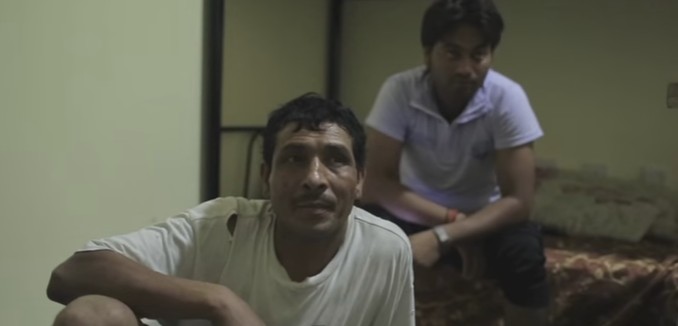Nearly 60% of Qatar’s residents live in what the government calls “labour camps,” according to an April 2015 census report released by Doha on Sunday.
Qatar’s Ministry of Development Planning and Statistics (MDPS) found that 1.4 million people reside in what the department described as “labour camps,” Agence France-Presse reported. At the time of the survey, the Gulf monarchy had a population of about 2.4 million. Nearly all of those living in the camps were men.
Qatar has come under international criticism in recent years over the harsh living and working conditions endured by its large migrant workforce, which is building the country’s infrastructure for the 2022 World Cup competition. Qatar utilizes a system of labor known as kafala, under which migrant workers must have a sponsor in order to enter and leave the country, effectively rendering them fully dependent on their host companies. Documented abuses in the system include workers not being paid or having their wages significantly lowered, abysmal working and living conditions, and even death.
Last week, 11 people were killed and another 12 injured after a fire broke out in one of the camps that host the workers.
Qatar’s treatment of its migrant workforce came increased scrutiny when it arrested a BBC crew investigating the conditions that laborers were forced to endure last year, as well as when it refused to allow Nepalese workers to return home last April following a devastating earthquake in that country. Qatar created an agency to polish its image following those scandals, but has not necessarily improved conditions for the workers.
Nepalese migrants building World Cup infrastructure died at a rate of one every two days in 2014, The Guardian reported.
Ben Cohen, senior editor of The Tower, captured the contrast between the positive press coverage Qatar hopes to receive and the grim reality facing migrant workers in The Fruitful Game: How Qatar Uses Soccer To Polish Its Image, which was published in the October 2014 issue of The Tower Magazine.
As sports retailers happily fed the insatiable public appetite for child-size replica jerseys of Barcelona idols like Lionel Messi and Andres Iniesta, the Qatar Foundation, whose logo was emblazoned in generous letters on the front of the shirt, became globally recognized. In the process, Qatar’s external image transformed from that of a remote desert emirate, 94 percent of whose inhabitants are migrant workers denied the education and healthcare rights granted to Qatari citizens, into a powerhouse supporter of scientific and commercial research, whether through the Qatar Foundation or through the numerous universities, like Carnegie Mellon and Paris’s HEC business school, with campuses in Qatar. By 2013, the Qataris were so confident of their progress that they swapped out the Qatar Foundation logo on Barcelona’s shirt for that of Qatar Airways, with no objections on the part of the Barcelona management. …
“Qatar is playing a double game,” Haras Rafiq, the outreach officer for the Quilliam Foundation, a counter-extremism think tank based in London, told me. “On the one hand, its rulers are promoting a positive image of the country by, for example, hosting the 2022 World Cup and sponsoring Barcelona. On the other hand, they’re supporting and harboring extremism and terrorism in the Middle East and around the world. They also operate what I would term ‘apartheid-like’ policies domestically—go there, and you’ll see shopping malls that are for Arabs only. I, as a Muslim of Pakistani descent, can’t go into those malls.”
The most savage of Qatar’s apartheid-esque qualities lies in the treatment of its 1.4 million migrant workers. Over the last two years, reports have repeatedly emerged of barbaric working conditions in the World Cup stadiums under construction, of unsanitary and crowded living quarters, and of the myriad abuses enabled by a labor relations system, known as the kafala, which converts the employer-worker relationship into a master-slave one. A government-issued report admitted that nearly 1,000 South Asian migrant workers died in 2012 and 2013; workers who built the 43-story al-Bidda Tower, which contains the headquarters of Qatar’s World Cup organizing committee, weren’t paid for over 13 months.
[Photo: The Guardian / YouTube ]




